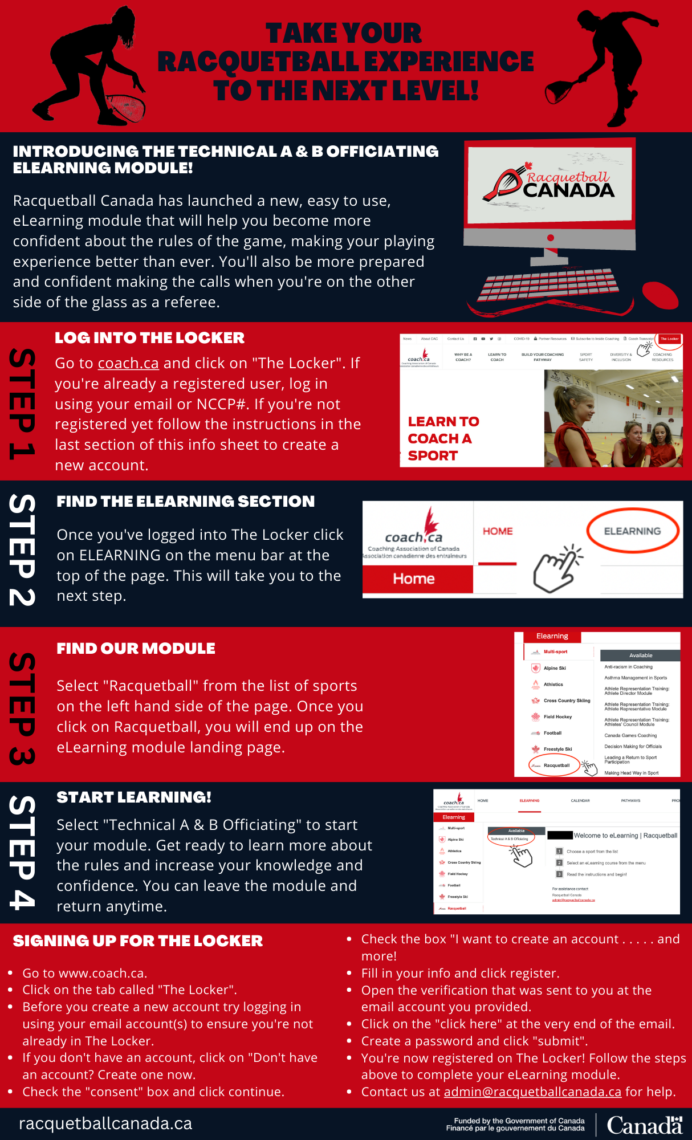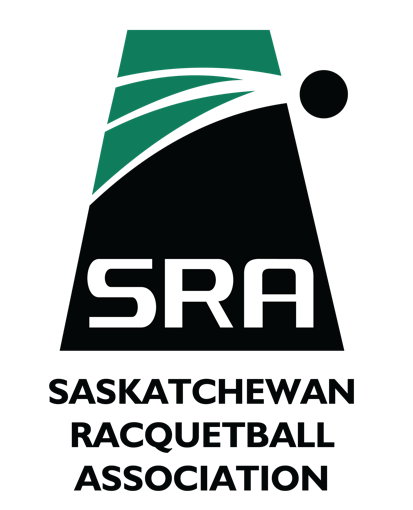General Information
Racquetball Canada strives to provide the best referees possible at its events, and there is a systematic program to achieve this aim. Racquetball Canada provides officials for the National Championships as well as the National Team Selection Events. Racquetball Canada also nominates people to referee at international racquetball events, including the World Championships, Junior World Championships, Pan American Championships and Pan American Games.
Officiating can be a very rewarding experience that is available to all members of Racquetball Canada. Individuals interested in becoming a certified Racquetball Canada certified can find further information in officials pathway below.
Technical A certification is a requirement for all participants to participate in the National Championships.
Officiating Levels & the Officiating Pathway
There are five levels in the Racquetball Canada officiating certification program:
- Technical A Official
- Technical B Official
- Level 1 Official
- Level 2 Official
- Level 3 Official
Officials work their way through the levels in a step-by-step manner, the education process is cumulative. At a minimum, you must be certified as a Technical A Official to officiate at a sanctioned tournament.
Becoming Certified
Technical A & B Certification
To ensure ease of certification at the introductory level of officiating, we provide a few options.
Technical A & B eLearning Module
It’s easier than ever to take your Technical A training and complete your Technical B exam. Take the free eLearning module – it’s the quickest and easiest way to be Tech A & B certified.
Follow the instructions on our infographic on how create a profile in the The Locker and find the module and click the button to begin your training. You may begin your training and return at anytime to complete it.

Technical A Clinic & Technical B Exam
If you prefer in person learning you can participate in a Technical A Clinic and then complete your Technical B Exam.
Technical A Certification
-
- accomplished by participating in a 90-minute course usually offered at the provincial level in conjunction with a sanctioned tournament. It is also offered annually at the National Championships.
-
- Course covers basic rules and situational analysis
-
- Is taught by a Level 2 Racquetball Canada official/referee
Technical B Exam
-
- Certification in Technical B is accomplished by successfully completing the Technical B Officiating Exam which is accessible as an online exam.
-
- You can opt to write your Technical B exam at anytime, however it is recommended that you complete a Technical A Clinic prior to completing the exam.
-
- For the exam, you should be completely familiar with the Racquetball Canada Rulebook, so that you can answer questions such as “What happens if a server takes too long to put the ball into play?” or “What is the call when a player’s serve hits his or her doubles partner, who is still standing in the service box?”
-
- There is no cost. Once you register to write the exam, you will be provided with
Level 1 Certification
- Individual evaluation of you officiating a match during at a sanctioned tournament. Official must demonstrate a basic level of proficiency when officiating.
-
- You can do this by making a request to Racquetball Canada to complete this at a nationally hosted tournament or to your Provincial Association to complete this at a provincial or local tournament.
Level 2 Certification
-
- Completion of a written exam which includes knowledge of rules, visual analysis and interpretation of rule application as it pertains to court situations. The emphasis is on game situations, as proper interpretation of the rules is critical.
-
- Evaluation of you officiating at a National Championship or National Team Selection Event, a specific form is used to assess the official’s rule knowledge, procedures and rule application.
-
- You will be evaluated on your officiating of (minimally) two open-level doubles matches and two open-level singles matches. The official will be observed by two Level 3 referees.
Level 3 Certification
-
- An accredited Level 2 referee has a one year waiting period to they practice their skills in sanctioned tournaments.
-
- Evaluation for level 3 occurs one year after level 2 certification. To be evaluated for Level 3 the official is observed by two Level 3 officials, in two open-level doubles matches and two open-level singles matches.
-
- Once certified as a Level 3 official, certification as an international official can be achieved by attending an international event and passing a written exam and officiating evaluation
-
- All Racquetball Canada Level 3 officials are eligible to apply for officiating positions at international events. Individuals who contribute in local and provincially sanctioned tournaments will be given primary consideration.
Selecting Tournament Officials for Events
Referees for the National Championships (May) are selected a few months prior to each event, and submissions are solicited via a notice on the Racquetball Canada website. Level 3 Officials are eligible for selection.
Racquetball Canada also nominates qualified officials to referee at International Racquetball Federation events, including the World Championships and World Junior Championships. These officials also need to have Level 3 certification.
Past Officials – Individuals who have refereed at IRF events in the past include Kurtis Cullen, Linda Ellerington, Chris Exner, Michel Gagnon, John Halko, Valari Hendrickson, James Landeryou, Tim Landeryou, Rick Mattson, Terry Nelson, Jen Saunders, Cal Smith, Dan Smith and Glen Yaretz.
Tournament Rules & Format
Injury and No Show Protocol
What happens if a player forfeits at match either through injury during the match, or by the player’s discretion prior to the match starting?
-
- Once a match has started and a player gets injured, this should be recorded as a injury default loss. This match will be included in the player’s ranking history as an injury default.
-
- A match that is not played and hasn’t started for any reason (injury or anything else) should be entered as a no show and won’t be counted in the ranking.
-
- It is the tournament director’s decision as to whether a player who defaults a match due to an injury or no show, can continue to play in future matches in the tournament.
Round Robin Rules
What happens when there is a tie in a division using a round robin format (i.e., every player plays every other player)? Find out via Official Round Robin Rules.
Racquetball Canada Rules
The International Racquetball Federation Official Rulebook is used for all sanctioned tournaments in Canada, including the Racquetball Canada National Championships, Junior National Championships and National Team Selection Events.
Rule Changes
Any participating country may propose a rule change to the International Racquetball Federation Rules Committee. The rule changes must be submitted in writing to the IRF Office, before January 15th of the year in which the World Championships are held.
Racquetball Canada’s Sport Development Committee accepts rule change proposals at anytime for consideration for submission to the IRF on behalf of Racquetball Canada.


